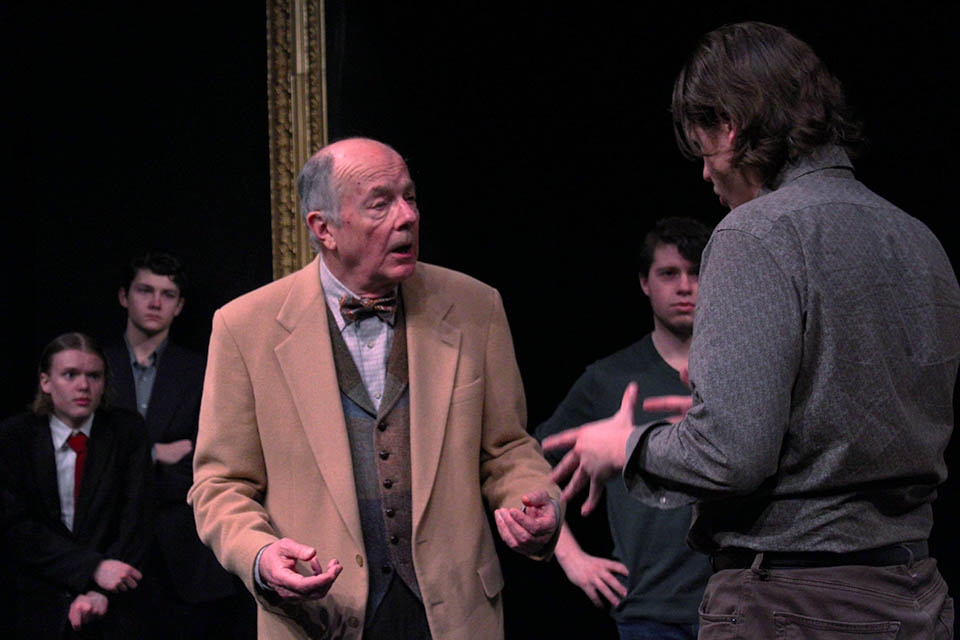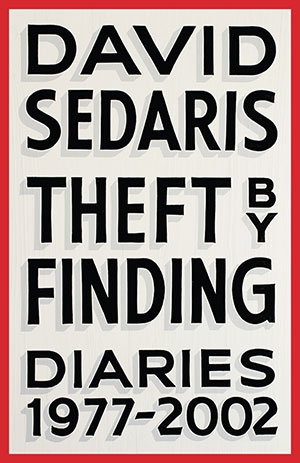

The father (Mark Yochum) is berated by a frustrated manager (Max Begler).
Josiah Martin | A&E Editor
02/14/19
It’s fairly safe to say that tackling metafiction — stories about stories — is a risky move. It’s easy for an author to disillusion an audience by getting into the philosophy of their craft. However, when a deep dive into this philosophy is played for laughs, as is the case with Luigi Pirandello’s Six Characters in Search of an Author, you have a recipe for success. Duquesne’s Red Masquers prove this with their latest production.
In the play, the manager of an acting troupe, played in the Masquers’ production by senior international marketing communications major Max Begler, is frustrated when six strangers interrupt a rehearsal claiming to be fictional characters from an unfinished work, looking for someone to finish their story for them.
The group of mysterious characters is led by the “father,” portrayed by retired Duquesne law professor Mark Yochum. Yochum’s long monologues about the very nature of fiction, about drama, the stage and existence itself, are at the core of the play. The character of “father” serves as Pirandello’s mouthpiece to wax philosophic about his trade, and Yochum nails the tone of these speeches, effectively stealing the show at some points. Yochum’s character sounds as if he has spent his entire existence pondering the nature of his very life, and he is frantically trying to sell these concepts to the uninterested, if not confrontational, manager.
The quality of Begler’s portrayal of the manager lies in his reactions to the father and the step-daughter, portrayed by theatre arts sophomore Liz Venesky. As the latter two characters argue and torment each other, they intrigue and engross the manager further and further until they inevitably, and repeatedly, push him to his breaking point. Begler’s screams caused me to jump out of my chair several times. The manager’s frustration with the characters is rivaled only by his frustration with himself for listening to them, and Begler’s increasingly exasperated tone makes this one of the most enjoyable aspects of the play.
The manager’s troupe of actors, unable to get any work done because of these intruders, are a near-constant source of entertainment, as they grow more and more annoyed with their uncooperative guests and their distracted manager. I cannot mention them without mentioning creative writing freshman Zach Reed, who plays a clueless and occasionally lewd actor who provides constant comedy on the periphery of the stage for keen-eyed audience members.
This story is not all laughs, though. At the core of the play-within-the-play is a slowly unfolding drama that is so dark, the manager doubts if it can even be put on stage. Alumni Nupur Charyalu’s portrays the character of the mother as heartbreakingly tragic from beginning to end. Surrounded by comedic characters and frantic arguments, her sadness feels heavy and real despite it all, as is true with history and secondary education sophomore Hannah Schmidt as her daughter, and accounting sophomore Liviu Reynolds as her son. Sophomore journalism and theater arts major Griffin Sendek’s near-catatonic character of the young son would be equally tragic if weren’t for a few moments of perfectly-executed comedy.
Upon its earliest performances in 1921, this show was harshly received by audiences, who found it nonsensical. I will concede that those hoping for some satisfying conclusion will not receive one. The play is absurdist and meta. Traditional storytelling conventions are not going to be found here, and that’s okay. As cliche as it may be to say that this is “the type of play that makes you think,” it truly is. It examines its own art form in such a unique and entertaining way that I cannot recommend it, and especially this Masquers production, enough.
Griffin Sendek, Features editor, acted in this production. His position on The Duke did not affect the content of this review.



